Tuesday, December 28, 2010
Eminem - Not Afraid
Sunday, December 26, 2010
Post Secret Sunday: Best Guy Friend
Labels:
beautiful,
friendship,
gratitude,
post secret
Saturday, December 25, 2010
Quote of the Week
 |
| Source |
“Memory is a way of holding on to the things you love, the things you are, the things you never want to lose.”
--Kevin Arnold, The Wonder Years

Labels:
a little thing called life,
kevin arnold,
love,
memories,
quote of the week,
quotes,
the wonder years
Friday, December 24, 2010
Mele Kalikimaka!
Labels:
christmas
Tuesday, December 21, 2010
R
 |
| Source |
Half past breaking dawn
Sun peeks out as if to say,
“Hello, my friend.”
Windows shut,
Blinds drawn.
Gone doubtin’ ourselves again.
Neden, dost arkadasim, neden?
A lifetime in 23 seasons reduced.
Neden, dost arkadasim, neden?
My, how you built us up!
Built—
--to break!
When reality’s fragile sands
Failed
To turn us into the image in your mind.
Pourquoi, mon amie, pourquoi?
A lifetime, to six seasons reduced.
Pourquoi, mon amie, pourquoi?

Labels:
friendship,
poems,
poetry
Saturday, December 18, 2010
Quote of the Week
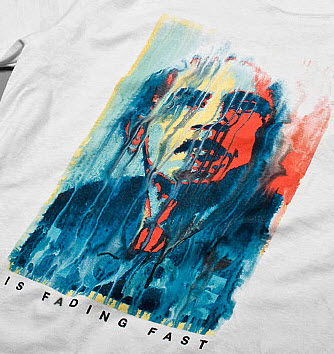 |
| Source |
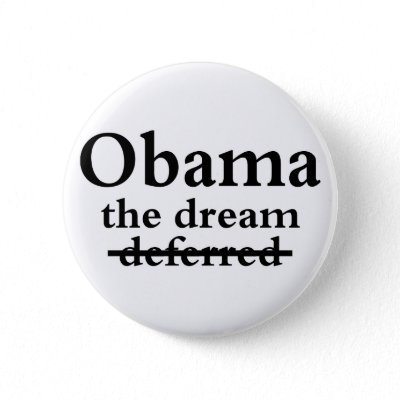 |
Source
--Langston Hughes |

Labels:
american dreams,
hope,
langston hughes,
obama,
quote of the week,
quotes
Wednesday, December 15, 2010
Because no other word could convey "love" as powerfully as "mom"
Saturday, December 11, 2010
Quote of the Week
 |
| Source |
A successful man is one who can lay a firm foundation with the bricks others have thrown at him.--David Brinkley

Labels:
david brinkley,
quote of the week,
quotes,
self-worth,
success,
unsinkable
Sunday, December 5, 2010
Post Secret Sunday: Different is not the 'other,' but an extension of 'us."
Moments and stories like these ignite my appreciation of the power of media. As frustrating as it is to be constantly bombarded with articles about what so-and-so wore to the red carpet, or how DMX violated his probation for the zillionth time, or how many cups of coffee Taylor and Jake shared in their courtship, I'm glad that shows like Glee are in the spotlight. I'm glad that LGBT and differently abled teens are not only represented in mainstream media, but are depicted as humans who just happen to be LGBT or have disabilities, rather than be defined by them. They're not the other; they're a part of us.

Labels:
acceptance,
differently abled,
LGBT RIghts,
post secret,
this is love,
unsinkable,
we are our brothers' and sisters' keepers
Saturday, December 4, 2010
Quote of the Week
Tuesday, November 30, 2010
TEN THINGS MEN CAN DO TO PREVENT GENDER VIOLENCE
| Source |
|
Copyright 1999, Jackson Katz. www.jacksonkatz.com
Reprint freely with credit.
Reprint freely with credit.

Labels:
accountability,
change,
humanity,
jackson katz,
social change,
speak,
TRUTH,
violence against women,
we are our brothers' and sisters' keepers,
womanism,
women's issues
Monday, November 29, 2010
4 Days after T-Day: 2 Cents from an Undercaffeinated Soul
 |
| Source |
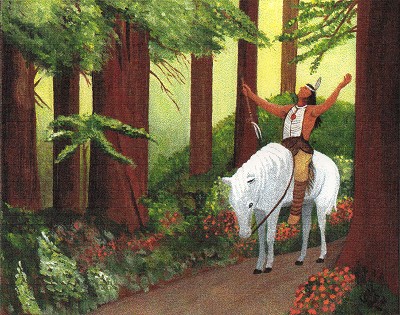 |
| Source |
I am grateful for my family, especially my beautiful momma, who taught me how to love unconditionally. This karaoke-addicted, fried fish-preferring, sack o' rice-hoarding, Gil Grisson-crushing, pink-loving, curly-haired woman is the breath in my lungs. She has the ability to strike fear into my heart by dropping hints that she'd like to have a talkative grandchild now, but nothing evokes the feeling of safety and being loved more than one of her hugs.
 |
| Source |
I am grateful that I not only found intellectual fulfillment at university, but learned how to be a kinder human being who can effect social change. For this, I can never tire of thanking D, B, M, and S. They teach and they advise, and are some of the best in their field, yet remain humble and continually engage in a genuine dialogue. They also have good taste, judging from the fact that they gave me an A.
I am grateful for mobile phone companies that offer unlimited (long-distance) calling, text messaging, and web browsing. Without them I'd be more broke than Toni Braxton.
 |
| Source |
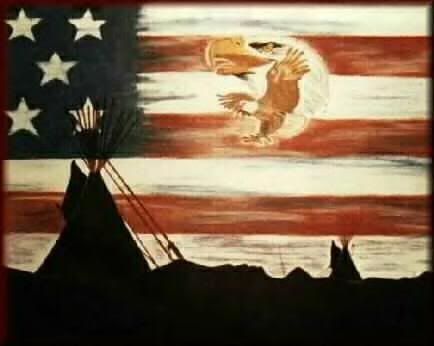 |
| Source |
I am grateful for love, because it is the most powerful choice there is. In the words of a people who can never vanish, I say to you all: Gv-ge-yu-hi. Do-da-ga-g hv-i.
I love you. Until we all meet again.
Be kind to one another.

Labels:
a little thing called life,
family,
love,
thanksgiving
Saturday, November 27, 2010
Quote of the Week
Labels:
deadlines,
douglas adams,
quote of the week,
quotes,
work
Thursday, November 25, 2010
The True Story Of Thanksgiving
Originally written by Richard Greener for The Huffington Post.
The idea of the American Thanksgiving feast is a fairly recent fiction. The idyllic partnership of 17th Century European Pilgrims and New England Indians sharing a celebratory meal appears to be less than 120 years-old. And it was only after the First World War that a version of such a Puritan-Indian partnership took hold in elementary schools across the American landscape. We can thank the invention of textbooks and their mass purchase by public schools for embedding this "Thanksgiving" image in our modern minds. It was, of course, a complete invention, a cleverly created slice of cultural propaganda, just another in a long line of inspired nationalistic myths.
The first Thanksgiving Day did occur in the year 1637, but it was nothing like our Thanksgiving today. On that day the Massachusetts Colony Governor, John Winthrop, proclaimed such a "Thanksgiving" to celebrate the safe return of a band of heavily armed hunters, all colonial volunteers. They had just returned from their journey to what is now Mystic, Connecticut where they massacred 700 Pequot Indians. Seven hundred Indians - men, women and children - all murdered.
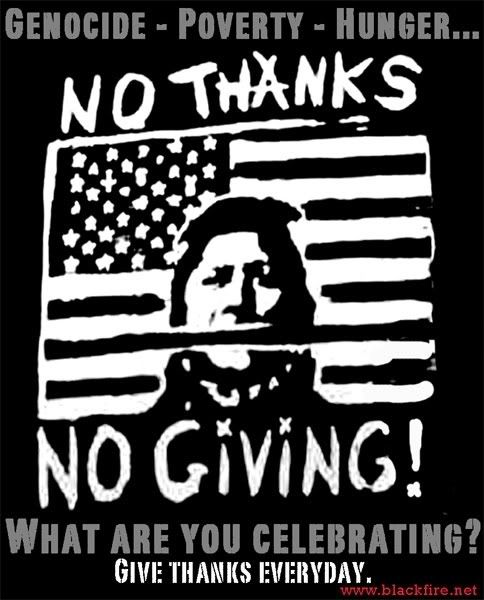 |
| Source |
This day is still remembered today, 373 years later. No, it's been long forgotten by white people, by European Christians. But it is still fresh in the mind of many Indians. A group calling themselves the United American Indians of New England meet each year at Plymouth Rock on Cole's Hill for what they say is a Day of Mourning. They gather at the feet of a stature of Chief Massasoit of the Wampanoag to remember the long gone Pequot. They do not call it Thanksgiving. There is no football game afterward.
How then did our modern, festive Thanksgiving come to be? It began with the greatest of misunderstandings, a true clash of cultural values and fundamental principles. What are we thankful for if not - being here, living on this land, surviving and prospering? But in our thankfulness might we have overlooked something? Look what happened to the original residents who lived in the area of New York we have come to call Brooklyn. A group of them called Canarsees obligingly, perhaps even eagerly, accepted various pieces of pretty colored junk from the Dutchman Peter Minuet in 1626. These trinkets have long since been estimated to be worth no more than 60 Dutch guilders at the time - $24 dollars in modern American money. In exchange, the Canarsees "gave" Peter Minuet the island of Manhattan. What did they care? They were living in Brooklyn.
Of course, all things - especially commercial transactions - need to be viewed in perspective. The nearly two-dozen tribes of Native Americans living in the New York area in those days had a distinctly non-European concept of territorial rights. They were strangers to the idea of "real property." It was common for one tribe to grant permission to another to hunt and fish nearby themselves on a regular basis. Fences, real and imagined, were not a part of their culture. Naturally, it was polite to ask before setting up operations too close to where others lived, but refusal in matters of this sort was considered rude. As a sign of gratitude, small trinkets were usually offered by the tribe seeking temporary admission and cheerfully accepted by those already there. It was clearly understood to be a sort of short-term rental arrangement. Sad to say, the unfortunate Canarsees apparently had no idea the Dutch meant to settle in. Worse yet for them, it must have been unthinkable that they would also be unwelcome in Manhattan after their deal. One thing we can be sure of. Their equivalent of today's buyer's remorse brought the Canarsees nothing but grief, humiliation and violence.
Labels:
accountability,
American Indians,
Americans,
genocide with a side of pumpkin pie,
thanksgiving,
TRUTH
Dismantling Thanksgiving Myths: A Native American Story
Originally published by NDN News in November 2008, but the topic at hand is a timeless TRUTH of the history of our country.
Dismantling Thanksgiving Myths: A Native American Story
 |
| Source |
by Aisha Ali, D.C. Youth Issues Examiner
In less than two weeks, Thanksgiving will arrive. The need for celebration may not come as easily for those who have lost their homes and have suffered many misfortunes throughout the year. However, one should be thankful for just being alive, shouldn’t they?
Nonetheless, I view Thanksgiving differently from others, even before this current economic crisis. While I always have expressed "thanks" for the many blessings God has bestowed upon me, with underserved communities experiencing destitution, living in substandard housing, being unable to properly care for their children; to afford health care; or to just overall survive, how could I be happy? To know many people would be homeless or starving on Thanksgiving certainly does evoke a "warm, light-hearted feeling".
The lives many Americans have experienced within the past few years, especially within the past year, have been the “ordinary” lives of many individuals for quite some time. Yes, the desolate life of others does intensify my gratefulness; however, as is the case with many middle-class Americans, my family has always been two or three paychecks away from homelessness. Still, this suffering of which I think on Thanksgiving does not discriminate me from others, as I am quite certain other Americans share the same sentiment. My view of Thanksgiving differs given my ethnic background as an individual of both African- and Native American descent. It is for this reason I always have held a jaded view concerning Thanksgiving, knowing its true history— or the true Native American story-- has yet to be published in many American history books.
In my eyes, Thanksgiving has never been about the Pilgrims-- and to many Americans, I question if this is their sole source of celebration, as many people blindly celebrate holidays and have no clue of their history. Although I am sure many people celebrate Thanksgiving as a way to express “thanks,” for me, Thanksgiving serves as another remembrance of how my Native American ancestors were maltreated; annihilated; ousted from their land; and consigned to reservations, eradicating every trace of their pre-existing life.
Thanksgiving rehashes memories of how the hospital staff, in its refusal to treat my great-great grandfather, sent him home to die from pneumonia because he was Native American. Thanksgiving reminds me of how my great-grandmother had “to pass” as a light-skinned black person to avoid being forced on a reservation. When thinking of Thanksgiving, I recall how my Nation, the Cherokees, was forced from its land in Georgia, leaving a “Trail of Tears.” As I sit around with my family and share thoughts while eating on Thanksgiving, I think of how the very ingredients with which my food was prepared, had been once picked by the hands of my Native American ancestors who served as slaves in North Carolina and the Caribbean. Needless to say, I also think of my African ancestors who toiled away in the fields to pick the very foods with which my food was prepared. America, to me, is not the “Land of Pilgrim’s pride," but should be and is to me, the "Land of Native American pride".
The national holiday, “Thanksgiving,” was not initially created in the way most Americans have come to know it.
Labels:
accountability,
American Indians,
Americans,
genocide with a side of pumpkin pie,
thanksgiving,
TRUTH
Thursday, November 18, 2010
Quote of the Week
 |
| Source |
If you do not feel yourself growing in your work and your life broadening and deepening, if your task is not a perpetual tonic to you, you have not found your place.
--Orison Swett Marden

Labels:
challenge,
growth,
orison swett marden,
quote of the week,
quotes
Saturday, November 13, 2010
Quote of the Week
 |
| Source |
More than any other time in history, mankind faces a crossroads. One path leads to despair and utter hopelessness. The other, to total extinction. Let us pray we have the wisdom to choose correctly.
--Woody Allen

Labels:
choices,
quote of the week,
quotes,
wisdom,
woody allen
Saturday, November 6, 2010
Quote of the Week
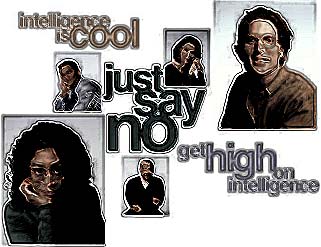 |
| Source |
Iron rusts from disuse; stagnant water loses its purity and in cold weather becomes frozen; even so does inaction sap the vigor of the mind.
--Leonardo Da Vinci

Saturday, October 30, 2010
Yo Soy
I am a cuddler.
I am a morning person.
I am an only child.
I am currently in my pajamas.
I am currently pregnant.
I am left handed.
I am married.
I am online 24/7, even as an away message.
I am a little shy around the opposite gender at first.
I bite my nails.
I can be paranoid at times.
I enjoy country music.
I enjoy smoothies.
I enjoy talking on the phone.
I have/had a hard time paying attention at school.
I have a hidden talent.
I have a tendency to fall for the “wrong” guy/girl.
I have all my grandparents.
I have been to another country.
I have been told that I have an unusual sense of humor.
I have or had broken a bone.
I have caller I.D. on my phone.
I have bathed someone.
I have changed a diaper.
I have changed a lot over the past year.
I have friends who have never seen my natural hair color.
I have had major/minor surgery.
I have killed another person.
I have had my hair cut within the last week.
I have mood swings.
I have no idea what I want to do for the rest of my life.
I have rejected someone before.
I have seen the television show The O.C.
I have seen the Lord of the Rings trilogy
I like the taste of blood.
I love Michael Jackson.
I love sleeping.
I love to shop
I own and use a library card.
I read books for pleasure in my spare time.
I am a morning person.
I am an only child.
I am currently in my pajamas.
I am currently pregnant.
I am left handed.
I am married.
I am online 24/7, even as an away message.
I am a little shy around the opposite gender at first.
I bite my nails.
I can be paranoid at times.
I enjoy country music.
I enjoy smoothies.
I enjoy talking on the phone.
I have/had a hard time paying attention at school.
I have a hidden talent.
I have a tendency to fall for the “wrong” guy/girl.
I have all my grandparents.
I have been to another country.
I have been told that I have an unusual sense of humor.
I have or had broken a bone.
I have caller I.D. on my phone.
I have bathed someone.
I have changed a diaper.
I have changed a lot over the past year.
I have friends who have never seen my natural hair color.
I have had major/minor surgery.
I have killed another person.
I have had my hair cut within the last week.
I have mood swings.
I have no idea what I want to do for the rest of my life.
I have rejected someone before.
I have seen the television show The O.C.
I have seen the Lord of the Rings trilogy
I like the taste of blood.
I love Michael Jackson.
I love sleeping.
I love to shop
I own and use a library card.
I read books for pleasure in my spare time.
I sleep a lot during the day.
I strongly dislike math.
I watch soap operas on a regular basis.
I am currently wearing socks.
I am tired.
I love to paint/draw/sketch/sculpt.
I strongly dislike math.
I watch soap operas on a regular basis.
I am currently wearing socks.
I am tired.
I love to paint/draw/sketch/sculpt.
Labels:
fun,
lemme have my shallow moments k?,
memity memes
Quote of the Week
Labels:
bill cosby,
fatherhood,
humour,
quote of the week,
quotes
Saturday, October 23, 2010
Quote of the Week
Labels:
benjamin franklin,
doctors,
humour,
quote of the week,
quotes
Friday, October 22, 2010
Parting is such sweet sorrow
Forget the trendy dining establishments Massholechewshits has to offer...
...libraries are where the kick-ass (nerds) roam*.
*And where one weirdo decides to take a Photo Booth break in the middle of endless readings and papers.

Saturday, October 16, 2010
Quote of the Week
Labels:
contentment,
peace,
proverbs,
quote of the week,
quotes
Subscribe to:
Comments (Atom)
We must never permit the voice of humanity within us to be silenced. It is Man's sympathy with all creatures that first makes him a Man.
--Albert Schweitzer
Everything can be taken from a man or a woman but one thing: the last of human freedoms to choose one's attitude in any given set of circumstances, to choose one's own way.
--Viktor E. Frankl












